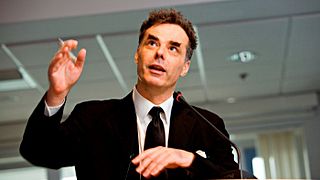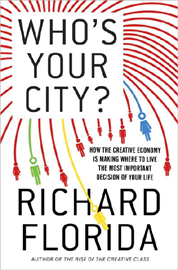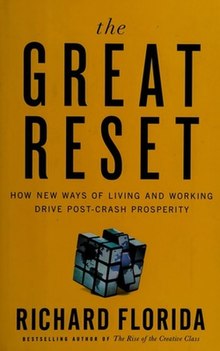
Economic history is the study of history using methodological tools from economics or with a special attention to economic phenomena. Research is conducted using a combination of historical methods, statistical methods and the application of economic theory to historical situations and institutions. The field can encompass a wide variety of topics, including equality, finance, technology, labour, and business. It emphasizes historicizing the economy itself, analyzing it as a dynamic entity and attempting to provide insights into the way it is structured and conceived.
Creative destruction is a concept in economics that describes a process in which new innovations replace and make obsolete older innovations.
Social history, often called "history from below", is a field of history that looks at the lived experience of the past. Historians who write social history are called social historians. Social history came to prominence in the 1960s, with some arguing that its origins lie over a century earlier.

Richard L. Florida is an American urban studies theorist focusing on social and economic theory. He is a professor at the Rotman School of Management at the University of Toronto and a Distinguished Fellow at NYU's School of Professional Studies.
William Julius Wilson is an American sociologist, a professor at Harvard University, and an author of works on urban sociology, race, and class issues. Laureate of the National Medal of Science, he served as the 80th President of the American Sociological Association, was a member of numerous national boards and commissions. He identified the importance of neighborhood effects and demonstrated how limited employment opportunities and weakened institutional resources exacerbated poverty within American inner-city neighborhoods.

The Progressive Era (1896–1917) was a period in the United States during the early 20th century of widespread social activism and political reform across the country that focused on defeating corruption, monopoly, waste, and inefficiency. The main themes ended during American involvement in World War I (1917–1918) while the waste and inefficiency elements continued into the 1920s. Progressives sought to address the problems caused by rapid industrialization, urbanization, immigration, and political corruption; and by the enormous concentration of industrial ownership in monopolies. They were alarmed by the spread of slums, poverty, and the exploitation of labor. Multiple overlapping progressive movements fought perceived social, political and economic ills by advancing democracy, scientific methods, professionalism and efficiency; regulating businesses, protecting the natural environment, and improving working conditions in factories and living conditions of the urban poor. Spreading the message of reform through mass-circulation newspapers and magazines by "probing the dark corners of American life" were investigative journalists known as "muckrakers". The main advocates of progressivism were often middle-class social reformers.
The creative industries refers to a range of economic activities which are concerned with the generation or exploitation of knowledge and information. They may variously also be referred to as the cultural industries or the creative economy, and most recently they have been denominated as the Orange Economy in Latin America and the Caribbean.

Urbanism is the study of how inhabitants of urban areas, such as towns and cities, interact with the built environment. It is a direct component of disciplines such as urban planning, a profession focusing on the design and management of urban areas, and urban sociology, an academic field which studies urban life.
The creative class is the posit of American urban studies theorist Richard Florida for an ostensible socioeconomic class. Florida, a professor and head of the Martin Prosperity Institute at the Rotman School of Management at the University of Toronto, maintains that the creative class is a key driving force for economic development of post-industrial cities in the United States.
Urban history is a field of history that examines the historical nature of cities and towns, and the process of urbanization. The approach is often multidisciplinary, crossing boundaries into fields like social history, architectural history, urban sociology, urban geography, business history, and archaeology. Urbanization and industrialization were popular themes for 20th-century historians, often tied to an implicit model of modernization, or the transformation of rural traditional societies.
In United States politics, modern liberalism, a form of social liberalism, is one of two current major political ideologies. It combines ideas of civil liberty and equality with support for social justice. Economically, modern liberalism supports government regulation on private industry, opposes corporate monopolies, and supports labor rights. Its fiscal policy opposes any reduction in spending on the social safety net, while simultaneously promoting income-proportional tax reform policies to reduce deficits. It calls for active government involvement in other social and economic matters such as: reducing economic inequality, increasing diversity, expanding access to education and healthcare, regulating economic activity, and environmentalism. Modern liberalism was formed in the 20th century in response to the Great Depression. Major examples of modern liberal policy programs include the New Deal, the Fair Deal, the New Frontier, the Great Society, the Affordable Care Act, and the Infrastructure Investment and Jobs Act.
Economic stagnation is a prolonged period of slow economic growth, usually accompanied by high unemployment. Under some definitions, slow means significantly slower than potential growth as estimated by macroeconomists, even though the growth rate may be nominally higher than in other countries not experiencing economic stagnation.

In the context of the 20th-century history of the United States, the Second Great Migration was the migration of more than 5 million African Americans from the South to the Northeast, Midwest and West. It began in 1940, through World War II, and lasted until 1970. It was much larger and of a different character than the first Great Migration (1916–1940), where the migrants were mainly rural farmers from the South and only came to the Northeast and Midwest.

Daniele Archibugi is an Italian economic and political theorist. He works on the economics and policy of innovation and technological change, on the political theory of international relations and on political and technological globalisation.
A creative city is a city where creativity is a strategic factor in urban development. A creative city provides places, experiences, attractions, and opportunities to foster creativity among its citizens.

Who's Your City?: How the Creative Economy Is Making Where You Live the Most Important Decision of Your Life is a non-fiction book written by Richard Florida. The book advances Florida's previous work on the locational choices of people and businesses. He adds a dimension of environmental psychology by assigning psychological profiles to urban regions according to the dominant personality traits of the people who live there. For example, the New York metropolitan area and the ChiPitts area have the highest concentration in the United States of people whose dominant personality trait is neuroticism. The book ends with a ten step guide to choosing a location best suited to the reader's personality and life situation.

Weird City: Sense of Place and Creative Resistance in Austin, Texas is a non-fiction scholarly text by Joshua Long published in 2010 by University of Texas Press. The book uses the "Keep Austin Weird" movement as a central focus to discuss the social, cultural and economic changes occurring in Austin, Texas, at the beginning of the 21st century. Largely written from a human geography perspective, Weird City is intended to show the relationship between sense of place and urban economies, the environment, and the urban cultural landscape.
Tenstar Community, often known simply as "TEN", is a Third Sector not-for-profit movemente and association established and registered in Italy, in the city of Verona.
A creative economy is based on people's use of their creative imagination to increase an idea's value. John Howkins developed the concept in 2001 to describe economic systems where value is based on novel imaginative qualities rather than the traditional resources of land, labour and capital.: Compared to creative industries, which are limited to specific sectors, the term is used to describe creativity throughout a whole economy.
The Great Reset Initiative is an economic recovery plan drawn up by the World Economic Forum (WEF) in response to the COVID-19 pandemic. The project was launched in June 2020, with a video featuring the then-Prince of Wales Charles released to mark its launch. The initiative's stated aim is to facilitate rebuilding from the global COVID-19 crisis in a way that prioritizes sustainable development.








